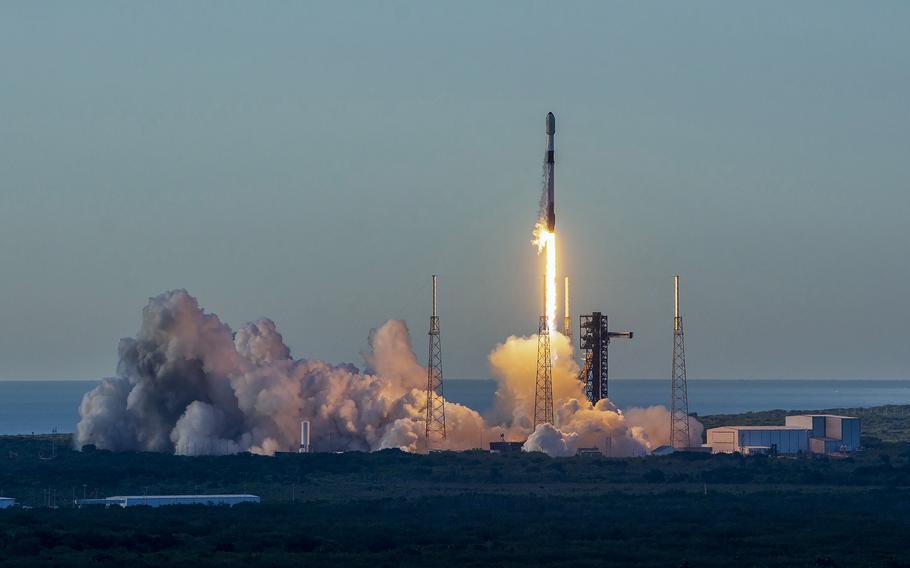
A SpaceX Falcon 9 rocket carrying 23 Starlink satellites launches from Cape Canaveral Space Force Station’s Space Launch Complex 40 on June 27, 2024. (SpaceX/TNS)
LOS ANGELES (Tribune News Service) — SpaceX’s workhorse Falcon 9 rocket, which carries astronauts to the International Space Station, experienced a rare failure Thursday night after blasting off from Vandenberg Space Force Base on an uncrewed mission.
The rocket, which had a payload of 20 satellites for SpaceX’s Starlink internet network, took off without incident about 7:30 p.m. Pacific time, but the second stage of the rocket that delivers the satellites into their final orbit failed.
SpaceX said the failure resulted in the satellites reaching a lower orbit than intended. SpaceX CEO Elon Musk tweeted that after engineers attempted to restart it, the second stage experienced an “RUD,” an acronym for “rapid unscheduled disassembly,” typically shorthand for an explosion.
On Friday, SpaceX said it appeared a liquid oxygen leak had developed in the second stage of the rocket, though a thorough investigation would be needed to learn the root cause of the accident.
The failure prompted the Federal Aviation Administration to ground the rocket pending the outcome of an investigation into the cause of the accident. Musk said in his tweet that the data from the launch was being reviewed.
Laura Forczyk, executive director of space industry consultancy Astralytical, noted that satellites were not destroyed when the rocket’s second stage failed, indicating that the payload carrying the satellites had adequately separated at the time the stage apparently exploded.
If this had been a flight carrying SpaceX’s Dragon Crew capsule, it would not necessarily have been catastrophic, she said, since the capsule could return to Earth using its parachute system.
The 20 satellites are expected to fall out of orbit and burn up in the atmosphere, SpaceX said Friday.
The rocket has launched SpaceX’s Dragon Crew capsule with astronauts aboard to the space station more than a half dozen times since 2020. It was scheduled to launch another crew in August.
In all, the Falcon 9, which has a reusable first stage, has launched a total 352 missions, according to SpaceX. The company said the first stage used in Thursday’s night launch returned to Earth safely.
The Falcon 9 last failed in flight in June 2015 when it was carrying out an uncrewed cargo resupply mission to the space station. A Falcon 9 also exploded on the launchpad at Cape Canaveral Air Force Station in September 2016 during fueling while carrying a satellite payload.
A lengthy grounding of the rocket would deal a blow to the U.S. space and global satellite industries, which rely on the rocket to launch satellites not only for SpaceX but other customers.
NASA has relied on the rocket and the Crew Dragon to ferry astronauts to the orbiting lab since awarding SpaceX a $2.6 billion contract in 2014 to develop the capsule.
The space agency awarded a larger $4.2 billion contract to Boeing to build its own capsule called the Starliner but that program is years behind SpaceX and only launched its first human test flight last month.
That mission, repeatedly delayed on the launch pad, was only supposed to last eight days but now may be extended for months due to problems with the Starliner propulsion system.
The next human flight of the Falcon 9 rocket had been scheduled for July 31 at Cape Canaveral Space Force Station, when it was expected to launch billionaire Jared Isaacman to space in a private tourist flight.
©2024 Los Angeles Times.
Visit at latimes.com.
Distributed by Tribune Content Agency, LLC.